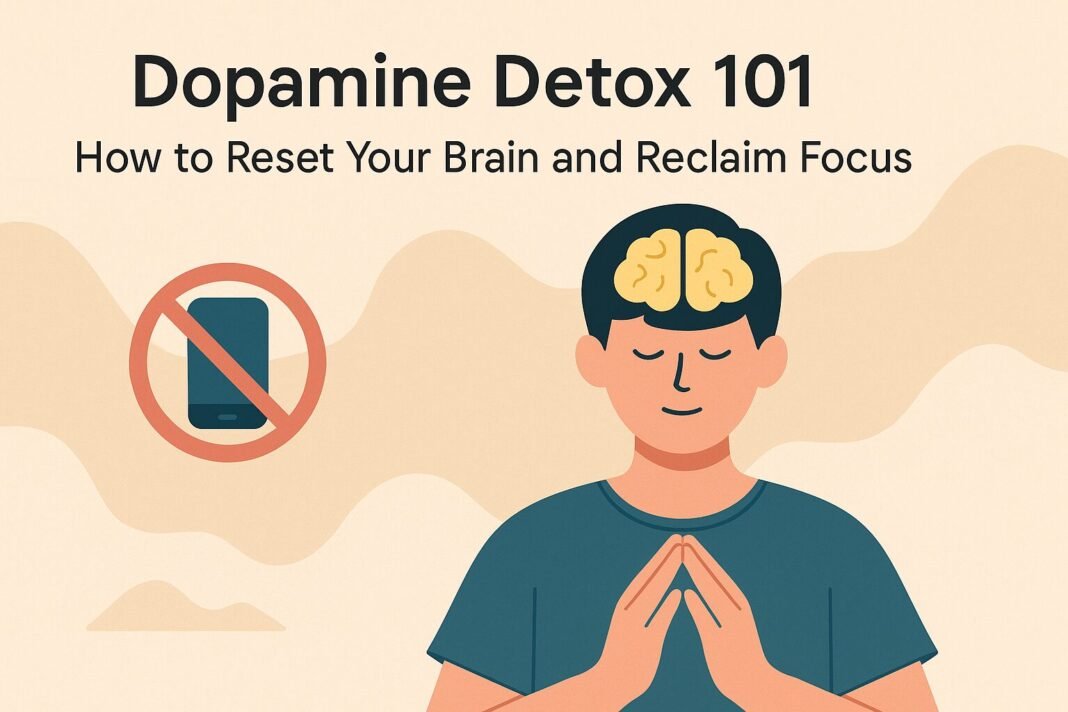Intro
You open a new tab to get something done—then suddenly, you’re checking Instagram, half-reading a newsletter, and wondering why you even came online. If this sounds familiar, you’re not alone.
We’re living in an age of dopamine overload—where every ping, scroll, and swipe offers a little hit of stimulation. But too much stimulation leaves us mentally scattered, burned out, and unfocused. That’s where a dopamine detox comes in. This beginner-friendly guide will walk you through what it really means, why it matters, and how to reclaim your clarity—without going off the grid.
Table of Contents
What Is Dopamine Detox?
A dopamine detox isn’t about removing dopamine from your brain—that’s not even possible. Dopamine is a vital neurotransmitter tied to motivation, reward, and focus.
Instead, a dopamine detox is about reducing overstimulation. It’s a reset that helps you retrain your brain to enjoy slower, deeper experiences again. You’ll reduce high-dopamine triggers (like endless scrolling) and replace them with low-stimulation, fulfilling activities.
This isn’t punishment—it’s behavioral clarity.
Why Modern Minds Are Overstimulated
Our phones, apps, and notifications are engineered to hijack attention. Every alert, swipe, or like activates our brain’s reward system. Over time, this floods us with dopamine spikes, making it harder to focus, rest, or find satisfaction in “slower” things like reading or thinking.
Constant input makes us passive consumers, burning out our mental energy without actually feeling satisfied.
“We don’t need more motivation. We need less stimulation.” — Cal Newport
Signs You Might Need a Detox
You don’t need a crash to benefit from a reset. But here are some signs your brain might be overloaded:
- You reach for your phone during every spare moment
- You can’t finish a task without opening 3 different apps
- Even fun things feel dull or boring
- Your to-do list feels like a foggy mountain
- You can’t focus for more than 10 minutes
- You scroll and feel more tired than before
- You feel mentally busy but get nothing done
What a Realistic Dopamine Detox Looks Like
Forget extremes. A realistic dopamine detox is flexible, kind, and effective. Here’s what it might look like:
- Morning no-stim zone: No phone or social media for the first 90 minutes
- Offline hours: Choose one block of time (2–4 hours) where you disconnect
- Mindful swaps:
- Journaling instead of consuming content
- Reading paper books instead of doomscrolling
- Silence instead of background YouTube
The goal: intentional inputs only.
Step-by-Step 7-Day Reset Plan
| Day | Action | Focus |
|---|---|---|
| 1 | App audit | Awareness |
| 2 | Track screen time | Self-check |
| 3 | Mute social feeds | Visual detox |
| 4 | Schedule 2-hr screen break | Mental reset |
| 5 | Replace with slow activity | Mindfulness |
| 6 | No-input reflection walk | Integration |
| 7 | Journal & reset plan | Long-term shift |
Each step helps you disconnect with purpose—and reconnect with your mind.
Mistakes to Avoid
- Going extreme: Deleting all apps cold-turkey can trigger more stress
- Isolating yourself: Digital detox doesn’t mean emotional shutdown
- Expecting “perfect” days: Progress > perfection
- Not replacing old habits: Detox fails if there’s nothing nourishing in place
Think reset, not punishment.
How to Maintain Long-Term Clarity
Dopamine detox isn’t a one-time fix—it’s a clarity habit. Keep your brain calm with:
- 10-minute no-input windows daily
- Weekly reset rituals (walks, digital cleanups)
- Single-tasking practices during work
- Mindful hobbies (drawing, stretching, slow cooking)
These small anchors will help you maintain your focus without extremes.
Final Thoughts
You don’t need to quit modern life—you just need to reclaim your attention. Dopamine detox is less about restriction and more about intention.
Try the 3-day version. Join the 7-Day Reset Challenge. Reconnect with what matters.
Need help getting started? Read: What Is Brain Fog? Symptoms, Causes & How to Clear It





